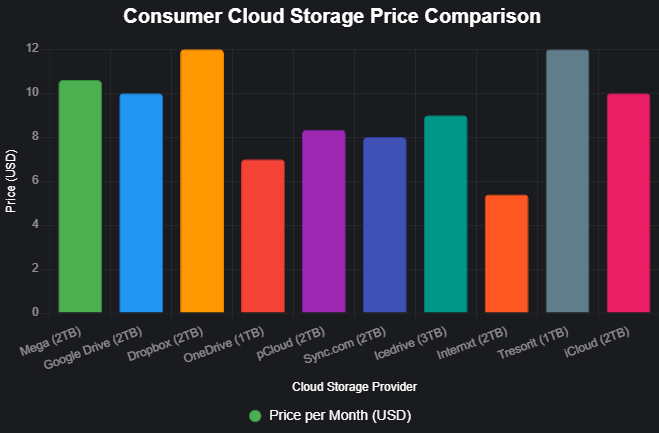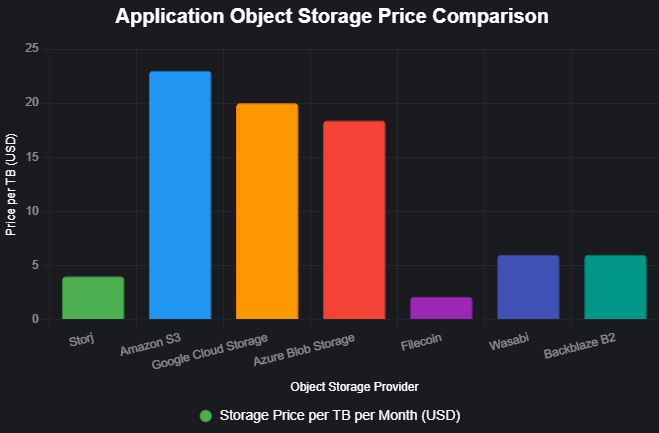File Storage Options: Mega, Storj, and Open-Source Compared
In today’s digital world, selecting the right file storage solution is essential, whether you’re an individual safeguarding personal files or a developer managing application data. This article evaluates two standout services: Mega for consumer cloud storage and Storj for application object storage. We compare them against all well-positioned competitors, analyze speed, security, and price, and explore open-source alternatives for both categories to determine the best options. Mega’s advanced file filtering, which allows precise control over synchronization, is a key highlight for consumers, setting it apart from services like Google Drive.
Consumer Cloud Storage
Mega: Secure and Feature-Rich
Mega, a New Zealand-based provider, is renowned for its privacy-first approach. It offers end-to-end encryption, ensuring only the user can access their data, making it ideal for privacy-conscious individuals. Mega provides a 20GB free tier, expandable to 30GB for the first year through tasks like app installation. Paid plans start at ~$6.09/month for 400GB, with the 2TB Pro I plan at ~$10.59/month (€9.99/month, converted at 1.06 USD/EUR).
Advanced File Filtering
Mega’s unique file filtering feature allows users to use wildcards for sync exclusions, such as excluding files with specific extensions (e.g., *.bak) or patterns. This granular control optimizes bandwidth and storage, a capability not as robustly offered by competitors like Google Drive, which relies on basic folder selection.
Competitors
We compare Mega with all major consumer cloud storage providers, based on recent analyses from sources like Cloudwards and ZDNET:
Google Drive (Google One):
- Free: 15GB
- 2TB: $9.99/month or $99.99/year (~$8.33/month)
- Integrates seamlessly with Google Workspace.
Dropbox (Dropbox Plans):
- Free: 2GB
- 2TB: $11.99/month or $119.88/year (~$9.99/month)
- User-friendly with reliable syncing.
Microsoft OneDrive (OneDrive Plans):
- Free: 5GB
- 1TB: $6.99/month (Microsoft 365 Personal)
- 6TB: $99.99/year (Family, ~$1.39/TB/month per user)
- Strong Windows integration.
pCloud (pCloud Pricing):
- Free: 10GB
- 2TB: $99.99/year (~$8.33/month)
- Lifetime plans available.
Sync.com (Sync.com Pricing):
- Free: 5GB
- 2TB: $8/month (annual)
- Zero-knowledge encryption included.
Icedrive (Icedrive Pricing):
- Free: 10GB
- 3TB: $8.99/month
- Fast and stylish interface.
Internxt (Internxt Pricing):
- Free: 1GB
- 2TB: $5.39/month (annual)
- Open-source with post-quantum cryptography.
Tresorit (Tresorit Pricing):
- Free: 3GB
- 1TB: $11.99/month
- HIPAA-compliant for professionals.
Apple iCloud (iCloud Pricing):
- Free: 5GB
- 2TB: $9.99/month
- Optimized for Apple devices.
iDrive (iDrive Pricing):
- Free: 10GB
- 5TB: $70/year (~$5.83/month)
- Focuses on backup and storage.
Box (Box Pricing):
- Free: 10GB
- 100GB: $10/month (Personal Pro)
- Collaboration-focused.
Comparison
Price
| Provider | Free Storage | 2TB Plan (Monthly, USD) | Price per TB/Month | Notes |
|---|---|---|---|---|
| Mega | 20GB | $10.59 | $5.30 | Annual (~€119.88/year) |
| Google Drive | 15GB | $9.99 | $5.00 | Monthly or $99.99/year |
| Dropbox | 2GB | $11.99 | $6.00 | Monthly or $119.88/year |
| OneDrive | 5GB | $6.99 (1TB) | $6.99 | Family plan: 6TB for $99.99/year |
| pCloud | 10GB | $8.33 | $4.17 | Annual ($99.99/year) |
| Sync.com | 5GB | $8.00 | $4.00 | Annual ($96/year) |
| Icedrive | 10GB | $8.99 (3TB) | $3.00 | No exact 2TB plan |
| Internxt | 1GB | $5.39 | $2.70 | Annual |
| Tresorit | 3GB | $11.99 (1TB) | $11.99 | No 2TB plan |
| iCloud | 5GB | $9.99 | $5.00 | Monthly |
| iDrive | 10GB | $5.83 (5TB) | $1.17 | Annual ($70/year) |
| Box | 10GB | $10 (100GB) | $100 | No 2TB personal plan |

Sync.com and pCloud offer the best value for 2TB, while Internxt is the cheapest. Mega’s pricing is competitive, bolstered by its security and free tier.
Security
- Zero-Knowledge Encryption:
- Included: Mega, Sync.com, Internxt
- Optional: pCloud (pCloud Crypto, extra cost)
- Not Available: Google Drive, Dropbox, OneDrive, iCloud, iDrive, Box
- Limited: Tresorit (HIPAA-compliant), Icedrive (paid plans)
Mega and Sync.com excel with default zero-knowledge encryption, ensuring maximum privacy. Internxt’s open-source approach adds trust.
Speed
Google Drive and Dropbox lead in syncing speed, especially within their ecosystems. Mega’s performance has improved, per TechRadar, but may lag during peak hours. pCloud, Sync.com, and Icedrive offer reliable speeds, while Internxt and Tresorit are slower.
Unique Features
Mega’s file filtering is unmatched for sync control. Google Drive and OneDrive integrate with productivity suites, while pCloud offers lifetime plans. Sync.com prioritizes security, and Icedrive focuses on performance.
Open-Source Consumer Alternatives
Open-source solutions provide control and privacy through self-hosting:
Nextcloud (Nextcloud):
- Description: A self-hosted platform for file storage, sharing, and collaboration.
- Pricing: Free; server or cloud hosting costs apply.
- Security: Supports encryption, 2FA, and custom configurations.
- Speed: Depends on server setup and internet connection.
- Use Case: Ideal for tech-savvy users or organizations needing privacy.
Seafile (Seafile):
- Description: Open-source file sync and share with community and professional editions.
- Pricing: Community edition free; professional edition has fees.
- Security: Client-side encryption available.
- Speed: Comparable to Nextcloud, server-dependent.
- Use Case: Suitable for teams prioritizing performance.
ownCloud (ownCloud):
- Description: Open-source file sharing with a community edition.
- Pricing: Free community edition; enterprise subscriptions available.
- Security: Encryption and access controls.
- Speed: Server-dependent.
- Use Case: Good for businesses transitioning to self-hosted solutions.
These options require technical expertise but offer unparalleled control and cost savings for long-term use.
Application Object Storage
Storj: Affordable and Decentralized
Storj is a decentralized, S3-compatible object storage platform that shards data across global nodes, reducing costs and enhancing security. It’s ideal for applications needing scalable storage. Pricing is:
- Storage: $4/TB/month
- Egress: $7/TB
- No API fees; $5 minimum usage fee unless prepaid.
Competitors
We compare Storj with all major object storage providers:
Amazon S3 (AWS S3 Pricing):
- Storage: ~$23/TB/month (Standard)
- Egress: ~$90/TB
- Industry-standard with extensive integrations.
Google Cloud Storage (GCS Pricing):
- Storage: ~$20/TB/month (Standard)
- Egress: Up to $120/TB
- Strong for analytics.
Microsoft Azure Blob Storage (Azure Pricing):
- Storage: ~$18.40/TB/month (Hot tier)
- Egress: Varies
- Windows-friendly.
Filecoin (Filecoin Pricing):
- Storage: ~$0.19-$4/TB/month
- Egress: Varies
- Decentralized, market-driven.
Wasabi (Wasabi Pricing):
- Storage: $6/TB/month
- Egress: Free up to stored amount
- Cost-effective alternative.
Backblaze B2 (Backblaze B2 Pricing):
- Storage: $6/TB/month
- Egress: $10/TB
- S3-compatible, simple pricing.
Comparison
Price
| Provider | Storage Price/TB/Month (USD) | Egress Price/TB (USD) | Notes |
|---|---|---|---|
| Storj | $4 | $7 | Decentralized |
| Amazon S3 | $23 | $90 | Standard tier |
| Google Cloud Storage | $20 | $120 | Standard, single region |
| Azure Blob Storage | $18.40 | Varies | Hot tier |
| Filecoin | $0.19-$4 | Varies | Market-driven |
| Wasabi | $6 | Free (up to stored amount) | No API fees |
| Backblaze B2 | $6 | $10 | S3-compatible |

Storj is among the cheapest, alongside Wasabi and Backblaze B2. Filecoin’s pricing varies, making Storj more predictable.
Security
- Storj: End-to-end encryption, data sharded for resilience.
- Amazon S3, Google Cloud Storage, Azure: Server-side encryption; client-side optional.
- Filecoin: User-managed encryption.
- Wasabi, Backblaze B2: Server-side encryption, client-side optional.
Storj’s decentralized model enhances security and privacy.
Speed
Traditional providers offer consistent low-latency performance. Storj’s decentralized nature may lead to variable speeds, though it claims competitiveness for many workloads. Filecoin’s performance depends on miner availability, while Wasabi and Backblaze B2 match traditional providers.
Open-Source Application Alternatives
Open-source object storage solutions are ideal for organizations managing their own infrastructure:
MinIO (MinIO):
- Description: High-performance, S3-compatible object storage.
- Pricing: Free; hardware or cloud costs apply.
- Security: Encryption at rest and in transit, access controls.
- Speed: Optimized for large-scale data.
- Use Case: Enterprises needing S3-compatible storage.
Ceph (Ceph):
- Description: Distributed storage for object, block, and file storage.
- Pricing: Free; requires hardware.
- Security: Encryption and access controls.
- Speed: Scalable and high-performance.
- Use Case: Large-scale, resilient storage.
GlusterFS (GlusterFS):
- Description: Scalable network filesystem for object storage.
- Pricing: Free; hardware costs.
- Security: Standard security features.
- Speed: Good for distributed environments.
- Use Case: Flexible storage solutions.
These solutions offer cost savings and control but require technical expertise for deployment and maintenance.
Conclusion
Mega and Storj are strong contenders in their domains. Mega’s zero-knowledge encryption and file filtering make it ideal for privacy-focused consumers, though Sync.com and pCloud offer better value. Storj’s low-cost, secure object storage suits developers, with Wasabi and Backblaze B2 as close competitors. Open-source options like Nextcloud and MinIO provide flexibility for those who can self-host, balancing cost and control. Your choice depends on priorities—privacy, affordability, or scalability.